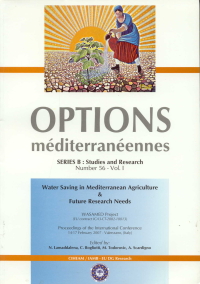| Article précédent | p. 277-289 | Article suivant |
Deficit irrigation scheduling in processing tomato
In order to save water, a reduced crop irrigation regime is to be undertaken and the scheduling of irrigation becomes a crucial facet of the overall irrigation technique. Deficit irrigation can be applied regularly along the whole cropping season or according to the crop sensitivity to water with respect to different crop stages. In this latter case a 'regulated' deficit irrigation is carried out, converging watering in the most sensitive stages so to optimize crop productivity. Crop yield response to water can be synthetically stated by means of the ky coefficient (FAO, 1979), defined as the relative reduction in crop yield corresponding to a relative crop evapotranspiration deficit. Tomato, according to the FAO classification, is considered a moderately sensitive crop and its ky value is estimated equal to 1.05 over the total cropping season. Trials worked out from different authors in the same Mediterranean conditions, generally exhibited contrasting ky values, lower or higher than FAO, without discriminating from the different crop phenological stages. The aim of the paper, after two years of experimental trial, is to derive tomato ky values with respect to the whole crop cycle as well as to different crop stages. Interesting considerations are suggested as regard to tomato irrigation strategy.
Les nouvelles techniques d'irrigation développées dans le but de réduire la consommation d'eau font appel à la programmation qui joue un rôle déterminant. Les techniques d'irrigation déficitaire peuvent ainsi être appliquée régulièrement, tout au long du cycle de la culture ou bien à différents stades, en fonction de la sensibilité de la culture à l'eau. La réponse du rendement de la culture selon l'eau disponible peut être synthétiquement établie avec le coefficient ky (FAO, 1979), défini comme la réduction relative du rendement de la culture correspondant au déficit relatif d'évapotranspiration de celle-ci. La tomate, selon la classification de la FAO, est considérée comme une culture modérément sensible et la valeur de ky est estimée à 1,05 pour la totalité du cycle. Des essais menés par différents auteurs, dans des conditions méditerranéennes similaires, ont montré des valeurs ky supérieures ou inférieures à celles de la FAO, sans distinction des différents stades du cycle. L'objectif de cet article, après deux ans d'expérimentation, est de déduire les valeurs ky de la tomate pour la totalité du cycle et pour les différents stades et d'émettre ainsi plusieurs suggestions pour la stratégie d'irrigation.
- [ Afficher ]
- [ Télécharger ]
- [ Exporter la citation ]
Vous pouvez télécharger la citation au format :
- [ Imprimer ]
-
Mots-clés
CALENDRIER DES IRRIGATIONS, DOSE D'IRRIGATION, LYCOPERSICON ESCULENTUM, RELATION PLANTE EAU, RENDEMENT DES CULTURES, REPONSE DE LA PLANTECiter cet article
Gatta G., Giuliani M.M., Monteleone M., Nardella E., De Caro A. Deficit irrigation scheduling in processing tomato. In : Lamaddalena N. (ed.), Bogliotti C. (ed.), Todorovic M. (ed.), Scardigno A. (ed.). Water saving in Mediterranean agriculture and future research needs [Vol. 1]. Bari : CIHEAM, 2007. p. 277-289. (Options Méditerranéennes : Série B. Etudes et Recherches; n. 56 Vol.I). Proceedings of the International Conference WASAMED Project (EU contract ICA3-CT-2002-10013), 2007/02/14-17, Valenzano (Italy). http://om.ciheam.org/om/pdf/b56_1/00800119.pdf



